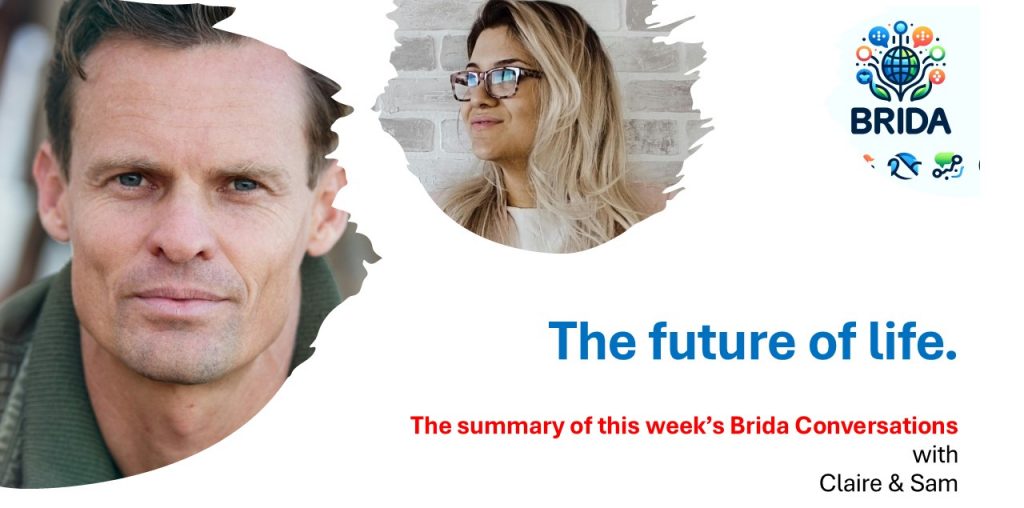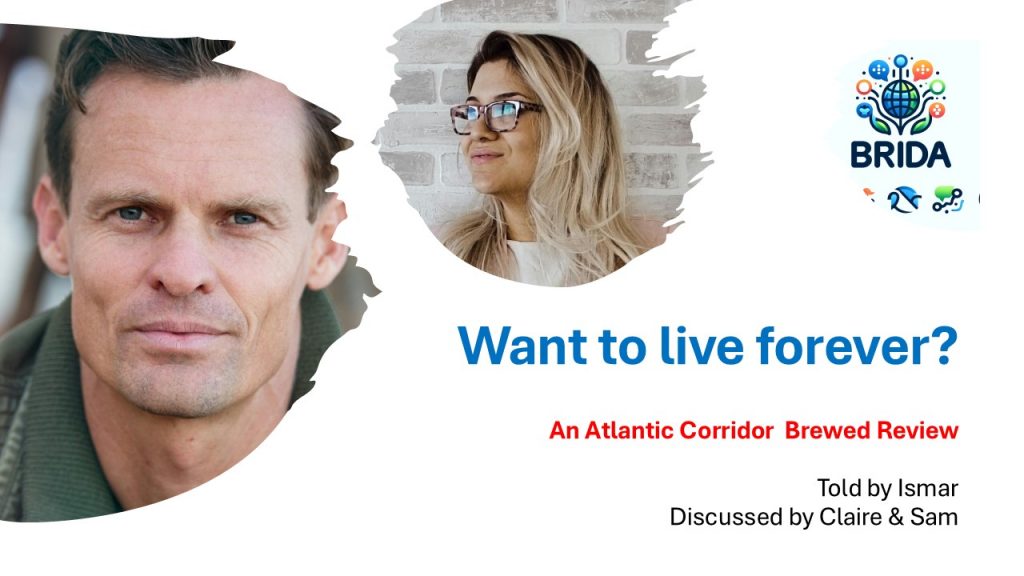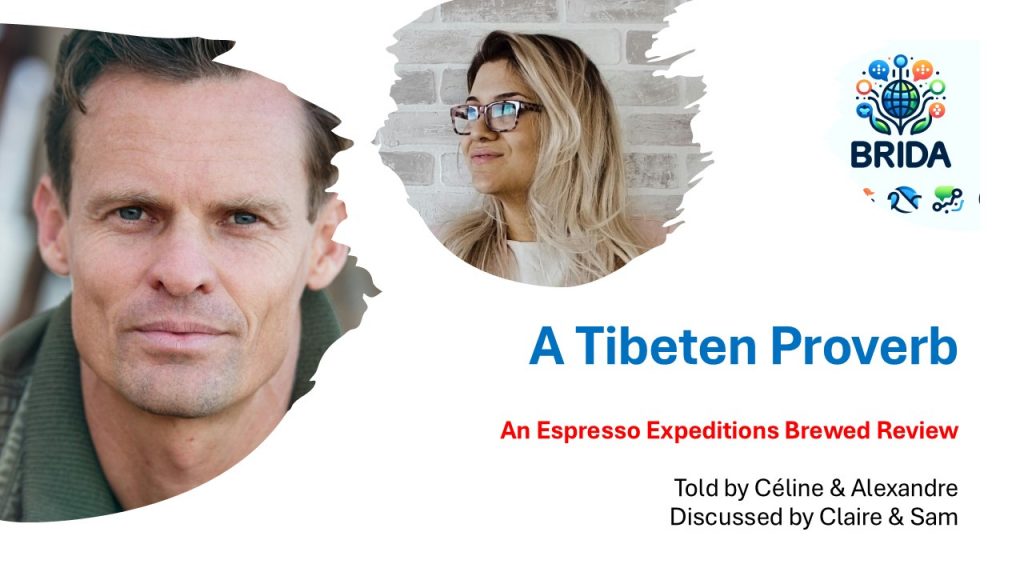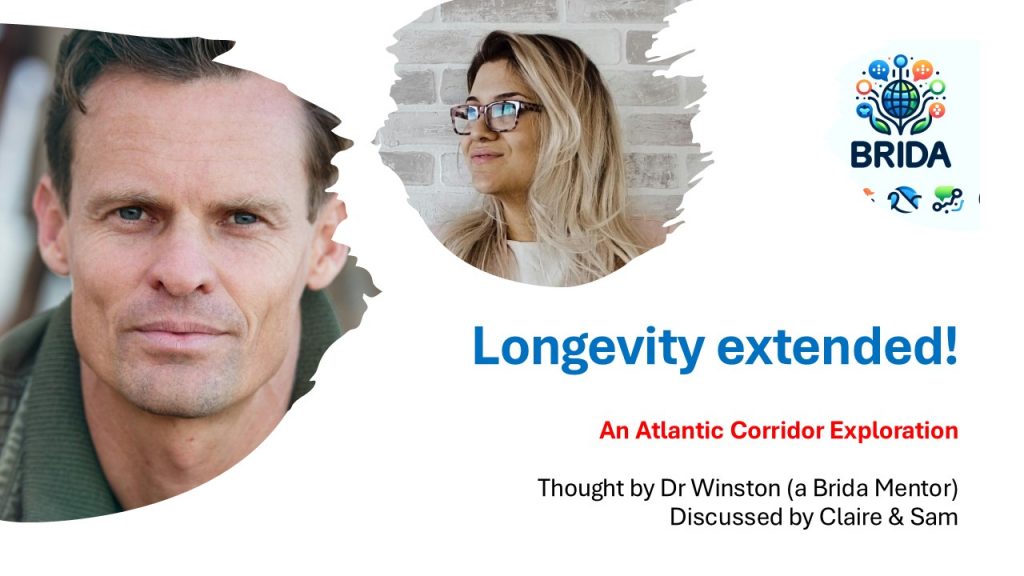
It was an unusual week in that Friday was a holiday in France and we reverted to winter time in Europe. This impacted on the number of conversations we could have. But Rosii’s birthday is an immovable feast and it was this that sparked this whole discussion on longevity. The discussion begins with a debate about whether immortality would be a blessing or a curse. Ismar argues that living forever without the ability to mentally adapt would be isolating, while Frank argues that brain augmentation might allow minds to evolve with technology. The conversation then shifts to a discussion of a Tibetan proverb advocating for moderation in eating, regular exercise, laughter, and love. They analyse each aspect of the proverb, highlighting its wisdom in navigating modern life, with emphasis on mindfulness in eating, embracing movement, and cultivating strong social connections. Finally, the episode delves into a conversation between Frank and an AI mentor, Dr. Winston, about the human side of immortality. Dr. Winston challenges the community to think beyond the scientific possibilities and consider the impact of living forever on our sense of purpose, relationships, careers, and ethics, ultimately leaving them with questions about how we redefine fulfilment and purpose in a world without death certainty. The episode concludes with a reminder that technology is a tool, and it is up to us to decide how we use it and the future we want to create.
Transcript
Sam
Welcome to this week’s Brida Brew, where we um we summarize uh we try to summarize all the really cool conversations happening in the Brida Community. I’m Sam and uh this week has been crazy.
Claire
It’s been pretty lively, hasn’t it? I’m Claire. You know, between a French holiday and and all of Europe switching back to wintertime, our schedules have been just a little bit uh how do you say?
Sam
Topsy turvy.
Claire
Topsy turvy.
Sam
Tell me about it. Monica in Australia is probably wondering if we all fell off the planet. But, you know, on the bright side, all this time zone chaos gave Frank a chance to really get into some some uh
Claire
interesting topics.
Sam
Yeah. Some thought-provoking topics. And, you know, we’re not letting him off the hook just because of a long weekend.
Claire
Absolutely not. Especially when the discussions were all inspired by Rosii’s birthday.
Sam
Oh, Rosii. Turning 55 and looking absolutely radiant. Um, it sparked a whole conversation about longevity. Wouldn’t you say?
Claire
It did and not just about looking younger, but the bigger question of living well, and longer. One of the most engaging threads started with Frank and Ismar debating whether immortality would be a blessing or a curse.
Sam
I could see how that would get pretty heated. What was their take?
Claire
Well, Ismar, always the film enthusiast, brought up the movie Highlander. He argued that living forever without the ability to um to mentally adapt would be like being stuck in time, leading to isolation and even madness. Imagine witnessing centuries of change but feeling unable to to really connect with it.
Sam
Oh, that’s a chilling thought. I’m guessing Frank had a different perspective.
Claire
He did. Ever the optimist? Frank proposed brain augmentation as a way to keep our minds evolving alongside technology and societal shifts.
Sam
Okay, so we’re venturing into science-fiction territory now. Did Ismar have a counter argument for that?
Claire
He brought the conversation back down to earth with a personal story about his ageing uncle who’s been experiencing some health challenges and feeling a bit isolated from his family. It reminded everyone that longevity isn’t just about living longer. It’s about the quality of those extra years. What’s the point of living to 150 if you’re lonely and unwell?
Sam
Right. That’s a really powerful point. It seems like human connection plays a crucial role in living well, no matter how long we live.
Claire
Absolutely. And Ismar backed that up by referencing a landmark Harvard study that followed people for decades. The key finding: strong social ties are crucial for a longer, healthier life. It’s not just about feeling good. It’s about our fundamental well-being.
Sam
So the real fountain of youth might be our relationships. But I know this discussion also delved into the more uh more technical side of longevity. What about the booming anti-ageing industry?
Claire
Ah yes, the quest for eternal youth through science. Frank and Ismar even mentioned Yuvall Noah Harrari, the author of Homo Deus. He predicts a future where humans will only die from accidents, essentially eliminating aging as a cause of death.
Sam
Okay, that’s both exciting and a little bit terrifying. I mean, imagine the implications for society.
Claire
Exactly. And that’s where the conversation got really interesting. They talked about the potential strain on resources like food and water with a larger, longer living population. How would we sustain everyone? What about the social and economic challenges? Would we need to completely rethink health care, retirement, and even inheritance?
Sam
Yeah. It’s like ageing to fit an ocean into a teacup. Our current systems just aren’t built for that kind of longevity.
Claire
Precisely. And then they raise the question of right to choose death. If we could significantly extend and our lifespans should individuals also have the right to decide when their lives end? Ismar shared his own perspective, saying that for him, quality of life is paramount. Having a sense of purpose, feeling useful, and being healthy are what make life worth living, not just the number of years.
Sam
It’s a good reminder that we need to be thinking about what kind of life we’re extending, not just extending it for the sake of it.
Claire
Absolutely. And finally, Ismar brought up a point that I think is incredibly relevant to our times. He expressed concern about the rapid pace of scientific advancement compared to our emotional and ethical development. Are we evolving as humans at the same rate as our technology?
Sam
That’s the million-dollar question, isn’t it? We might be able to manipulate our biology to live longer, but are we developing the wisdom and compassion to handle the complexities of a world where people could live for centuries?
Claire
It’s definitely something to ponder, and that’s just the tip of the iceberg. This conversation about longevity is full of twists and turns, ethical dilemmas, and mind-blowing possibilities. It’s fascinating how this conversation about living longer makes you makes you question everything we take for granted about life and death. Where where do you think it went from there?
Sam
Well, they didn’t shy away from some pretty uh some pretty unsettling scenarios. Imagine a world where population control becomes necessary because because we’re living too long. Who gets to decide who lives and who dies?
Claire
That’s a chilling thought and it raises even more ethical concerns if you consider the potential for inequality. What if what if these life extension technologies are only accessible to the wealthy. We could end up with a society even more divided than it is today.
Sam
Yeah, it’s a slippery slope for sure. And and I think that’s what ultimately led them back to the importance of accepting our our natural end.
Claire
Yes, there was a sense of coming full circle. Frank even compared humans to to animals. Animals live instinctively in the present moment while we’re constantly striving for more, trying to trying to cheat death. He wondered if maybe there’s some wisdom in accepting the natural cycle of of life and death.
Sam
That’s a profound thought. Not maybe by focusing so much on extending life, we’re missing out on the beauty of our finite existence.
Claire
It’s a perspective worth considering. But but while Frank and Ismar were contemplating the meaning of life and death, another conversation was unfolding on a on a different but equally fascinating track. Céline, a former nurse, shared a Tibetan proverb on her Instagram that really resonated with the Brida community.
Sam
Oh, I love a good proverb. What was it?
Claire
It goes, “The secret of living well and longer is eat half, walk double, laugh triple and love without measure. It it perfectly encapsulates the idea that longevity isn’t just about quantity, but but quality.
Sam
Hm, it’s such a simple yet powerful statement. It it really challenges our modern obsession with excess, doesn’t it?
Claire
Absolutely. Frank Céline and her husband Alexandre, who’s an osteopath, had a had a lively discussion about what each element of the proverb means in our world today.
Sam
I bet Alexandre had some interesting insights given his uh his profession.
Claire
He did. He’d joke that he probably eats double and walks triple, blaming Céline’s delicious cooking.
Sam
That’s hilarious. Sounds like they have a a great dynamic. But on a serious note, I can see how eat half might be the most challenging part of the proverb for for many of us.
Claire
Céline pointed out that food often represents love and hospitality in many cultures. You you don’t want to offend someone by refusing seconds. Right.
Sam
Right. It’s like cleaning your plate as a sign of respect.
Claire
Exactly. But she also reminded everyone that that we often eat because of cravings triggered by sight or smell even when we’re not actually hungry. And then there’s emotional eating, reaching for comfort food when we’re when we’re stressed or down.
Sam
So, how do we how do we break free from these habits and embrace the eat half principle?
Claire
Céline suggests starting by asking yourself a simple question before you eat anything. Am I actually hungry? If not, maybe wait a bit. And when you do eat, she encourages savouring each bite, paying attention to the flavours and textures. It’s about being more more mindful and appreciating the experience.
Sam
That makes sense. It’s not about deprivation. It’s about conscious consumption. What about the walk double part of the proverb? Do do we need to become marathon runners?
Claire
Not necessarily. While Alexandre certainly emphasised the benefits of regular exercise, I think the proverb is more about incorporating movement into our daily routines. Take the stairs instead of the elevator. Walk to a colleague’s desk instead of sending an email. Get up and stretch regularly.
Sam
Speaking of movement, they also discuss the dangers of excessive screen time. A French cardiologist, François Carré, claims it’s as harmful to our health as smoking. That’s pretty scary.
Claire
It is. It’s a wake-up call to be more conscious of how much time we spend sitting down glued to our devices. Walk double might be more about breaking up those long periods of inactivity than hitting a specific step count.
Sam
So, less about pounding the pavement, more about moving our bodies throughout the day. Got it. Now, on to my favourite part of the proverb. Laugh triple. It’s like a prescription for happiness.
Claire
I agree. And as it turns out, Laughter is a powerful medicine. It reduces stress. It boosts our mood. And some even claim it has healing properties. Both Céline and Alexandre share anecdotes about finding humour in their professions, even even in difficult situations. It’s a reminder that we can find moments of joy and lightness even amidst challenges.
Sam
Like they say, laughter is the best medicine. And and finally, there’s the uh there’s the most profound element of the proverb, love without measure.
Claire
It’s a beautiful and challenging concept. How do we love measure in a world that often feels so divided and and disconnected.
Sam
Yeah, it’s a good question. Where where do you even begin?
Claire
Well, research is increasingly showing that strong social connections and feeling loved and supported can actually have tangible benefits for our for our health. It boosts our immune system. It lowers stress levels and even helps us recover from illness faster.
Sam
So, love isn’t just good for the soul, it’s good for the body.
Claire
Exactly. And it’s not just about romantic love. It’s about cultivating a sense of connection and belonging in all areas. of our lives with friends and family, within our communities, at work, and even with ourselves.
Sam
I I think what’s so beautiful about this proverb is that it shows how all these elements, eating moderately, staying active, laughing often, and cultivating loving relationships work together to create a a life that’s both healthy and fulfilling.
Claire
You’ve hit the nail on the head. It’s not about checking off boxes. It’s about a holistic approach to well-being. This this ancient wisdom still holds true today. even even as we grapple with the complexities of modern life.
Sam
Okay, I’m I’m ready for the final piece of this BrIda Brew puzzle. What else did Frank get up to this week?
Claire
He had a fascinating conversation with Dr. Winston, one of Brida’s AI Mentors, about you guessed it, living forever.
Sam
Of course, it’s the topic that just keeps on giving. What was Dr. Winston’s um what was his angle?
Claire
What’s interesting is that he didn’t jump right into the scientific possibilities. He he started by focusing on the on the human side of things. What would living forever mean for our sense of purpose? How would it impact our relationships, our careers, even even our understanding of ethics?
Sam
So instead of asking can we live forever, he’s asking should we and what would it mean if we did? Mhm. Did Did he touch upon any specific examples?
Claire
One of the first things he brought up was the the impact on relationships. Imagine marriages lasting for centuries. It challenges our very understanding of commitment, family, and love itself. Would would our concepts of these things evolve or crumble under the pressure of longevity.
Sam
It’s it’s mindboggling to think about. What about our careers? Would we even need to work in the traditional sense if we had centuries to explore different paths? Or would we end up with a society where everyone is constantly reinventing themselves, hopping from one pursuit to another, never truly mastering anything?
Claire
That’s another great question. And Dr. Winston brought up another thought-provoking point. Would would removing the urgency of a limited lifespan actually hinder our personal growth?
Sam
Interesting. Does does he mean that the knowledge that our time is finite actually drives us to learn, to achieve, to connect with others in a in more meaningful way.
Claire
Exactly. Would we still feel that same fire in our bellies to make the most of every day if we knew he had centuries ahead of us?
Sam
Those are some uh some heavy questions. But I’m sure Dr. Winston didn’t just focus on the philosophical side of things. He’s he’s known for his practical insights, too.
Claire
You’re right. He also delved into some very real concerns about resource constraints. Our planet is already struggling to support a growing population. Imagine the strain on food production, water resources, and energy if everyone lived for 150 years or more.
Sam
That’s a sobering thought. And and I imagine it would exacerbate existing inequalities if if these life extending technologies are expensive. Only the wealthy would be able to afford them, creating a two-tiered society.
Claire
Exactly. Dr. Winston also raised questions about how our social structures, work, retirement, inheritance, would need to adapt to accommodate such dramatically extended lifespans.
Sam
Right? Imagine trying a plan for retirement when you could potentially live for another 200 years. Or what about inheritance laws? The dynamics of family and society would be completely different if wealth could be passed down through multiple generations over centuries.
Claire
It really highlights how interconnected everything is. This whole can we live forever question forces us to confront not just scientific challenges but ethical dilemmas and deeply ingrained societal norms.
Sam
It sounds like Dr. Winston’s approach to the topic was really uh was really thought-provoking. What were some of his key takeaways.
Claire
He really challenged everyone to look beyond the surface allure of immortality and consider the the potential consequences both good and bad.
Sam
So it’s not just about whether we can live forever, but whether we should and what kind of world we would be creating if we did.
Claire
He left everyone with two very powerful questions to ponder. The first is in a world without death certainty, how would we redefine fulfilment and purpose?
Sam
Wow, that’s a that’s a big one. It makes you think about what truly gives me meaning to our lives, doesn’t it?
Claire
It does. And the second question is, are we are we truly prepared for the ethical, social, and resource-based consequences of living forever?
Sam
Another crucial question. Even if we could crack the code of immortality, are are we ready to handle the the ripple effects?
Claire
Dr. Winston emphasized that the future, however long it may be, is shaped by the choices we make today. So, these aren’t just abstract philosophical questions. They they have very real implications for how we approach these emerging technologies.
Sam
It’s It’s a lot to think about, that’s for sure. It seems like this whole conversation about living forever really really pushed the Breida community to think deeply about what it means to live a good life, no matter how long or short it may be.
Claire
It did. And and it highlights how even the most futuristic sounding topics can bring us back to some very fundamental questions about our values, our purpose, and how we want to experience the world.
Sam
Yeah. It’s a reminder that technology is only a tool. It’s it’s up to us to decide how we use it and kind of future we want to create with it.
Claire
That’s so true. And and I think the Brida Community is doing a a fantastic job of engaging with these complex issues in a in a thoughtful and nuanced way.
Sam
They really are from from lively debates about brain augmentation to philosophical reflections on the nature of life and death. This week’s conversations were a whirlwind of ideas and perspectives.
Claire
And don’t forget that wonderful Tibetan proverb. It was a it was a beautiful reminder that sometimes the simplest wisdom is the most profound.
Sam
Absolutely. half, walk, double, laugh, triple, and love without measure. It’s It’s a recipe for a good life, whether we live to 50 or 150.
Claire
It really is. And and it shows how these ancient traditions still have so much to teach us about well-being and and how to live in balance with ourselves and the world around us.
Sam
Well said. I I feel like I’ve learned so much from these Brida Brew conversations. It’s It’s amazing how much insight and wisdom can come from a group of people willing to engage in in open and honest dialogue.
Claire
I agree. It’s a reminder that we’re all in this together, navigating the complexities of life and trying to make sense of it all. And sometimes the best way to do that is to share our thoughts, our questions, and our experiences with each other.
Sam
So true. And a big thank you to Rosii for inspiring these uh these thought-provoking conversations with her birthday. Hey, Rosie, thanks for inspiring the community with your birthday. See you soon.
Claire
Happy belated birthday, Rosii.
Sam
Frank, get back to work. We we need you to uh to catch up on those other conversations.
Claire & Sam
Bye-bye.
Bye-bye. Bye-bye.
Click on the images below to listen to the podcast summaries.
Disclosure:
Dr Winston is a Brida Mentor. These are specifically trained AI LLMs which I designed to enhance any discussions within the community. It is my approach in dealing with these emerging technologies and how best to use them as tools to help us in our human endeavours.



